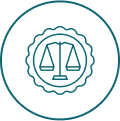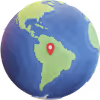
This Risk Assessment covers high-risk source countries for a number of high-risk commodities for land conversion, and how these intersect with a range of predicate crimes across the supply chain at three main stages: procurement of permit, supply of machinery and/or equipment, and primary commodity production.













Risks are categorised into three categories: high risk, medium risk and no specific evidence of intersection identified (between that country, commodity, supply chain stage and financial crime).
A more detailed description of the methodology, including why these regions, commodities and crime types were selected, can be found within the Risk Assessment.
Country risk refers to the specific risks associated with investing in or lending to a client based in a particular country. Such risks are relevant to assessing clients or customers, based on their jurisdiction (whether that is country of incorporation, domicile, tax residency or business operation).
Country risk assessments may account for financial crime risks as well as legal frameworks, more structural elements like political and geopolitical contexts, economic factors like the relative importance of different sectors, the size of the shadow economy, and the major trading partners. According to the Wolfsberg Group Guidance on Country Risk, higher risks should not necessarily preclude business being undertaken in that country but do indicate that a robust control environment is required manage that risk.
Risk assessments that cover land conversion are not only an important component of ESG programmes but also, given the extensive convergence with numerous predicate crimes, of their anti-financial crime measures.
Deforestation and land conversion risk assessments can help companies to make informed investment and relationship management decisions, analyse their portfolios, understand their ESG and financial crime risk exposure, and engage with third parties to reduce negative impacts in their supply chains.
The digital Risk Assessment contained within this panel can be used as a standalone tool to understand the links between land conversion and financial / other predicate crimes in a set of source countries in relation to specific commodities, or as a part of a suite of financial crime, wider country risk, or ESG risk assessments.
It is intended to help:
Relationship managers to understand latent risk associated with certain clients, countries or sectors before progressing to the next stage of a relationship.
Investigations analysts to understand where to best focus enhanced due diligence efforts.
Firms to reduce their exposure to the reputational, ESG and financial crime risks associated with land conversion.
Organisations with their risk profiling and designating risk appetite as regards land conversion.


The Environmental Crimes Financial Toolkit is developed by WWF and Themis, with support from the Climate Solutions Partnership (CSP). The CSP is a philanthropic collaboration between HSBC, WRI and WWF, with a global network of local partners, aiming at scaling up innovative nature-based solutions, and supporting the transition of the energy sector to renewables in Asia, by combining our resources, knowledge, and insight.




















